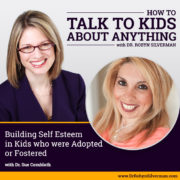 Self Esteem & Success: Have your Children and Students Developed their C.O.R.E.™?
Self Esteem & Success: Have your Children and Students Developed their C.O.R.E.™?
Dr. Robyn Silverman
Self-esteem is a powerful thing. From the outside, some kids may seem to have it all, but at their core, they may feel as if they can’t do anything right. You know what I mean? I know you do- you’ve experienced it yourself and seen it with your own eyes.
On the other hand, some may seem to have been dealt a poor hand in life and yet, as their core, they behave as if they can do, be, or have anything. When mindset, heart, and opinion of self are crucial predictors of success, self-esteem can certainly make the difference.
In order to help our students thrive as powerful character-based leaders, they must see themselves and their contributions as worthwhile. When I speak to audiences around the world about construction of self-esteem, I detail my C.O.R.E.™ concept: Comparison, Observation, Recognition, and Experience. See how it applies to the children and students in your life!
What’s at their C.O.R.E.™? 
Comparison: How do I stack up vs What strengths do I bring to the table? Those with low self-esteem often short change themselves while either elevating others or cutting them off at the knees in order to elevate themselves. Powerful role models don’t need to make comparisons to demean. Rather, they focus on what each person can bring to the table to form a cohesive group.
Observation: Do the messages I glean demean me or support me?Messages come from many sources— such as the media, peers and parents. What messages are being sent to different students at your school? When we feel we are unacceptable to those we admire and trust, lower self-esteem is likely. Strong role models seek out people who make them feel that they are okay just the way they are as well as who help them to deflect, reframe, or challenge the accepted belief. Strong role models also do this for themselves.
Recognition: Are my qualities and assets overlooked or celebrated?Those with low self-esteem are more likely to receive low praise. On the other side of the spectrum they may receive too much “empty praise.” The phrase “good job” is uttered no matter what they do so it doesn’t hold meaning anymore. Strong role models are built with real praise. When we celebrate meaningful assets in our children/students and connect them with character, process and outcome, words can be harnessed and used whenever that person is placed in a leadership position.
Expertise/Efficacy: Am I honing or phoning in my skills? True internal drive, determination and stick-to-itiveness allow us to reach mastery. The development of expertise also depends on the character to do each challenge to the best of our ability—to knowingly do it right even if we have the chance to “phone it in.” In our society, this takes more ethics than we might give credit for. “Quick fix” appearance-over-substance culture has taught young people to develop their personas instead of the person—to develop persona in lieu of their character. When expertise is acquired in an area of real interest, whether it’s in skills, teaching, or coaching, young people can hone and even personalize their skills. Let’s face it; it’s gratifying to make progress and achieve in areas that are meaningful to us.
Sample questions to assess esteem:
- What three things do you like about yourself?
- What three things could you teach someone how to do?
- What three people make you feel good about who you are?
- What experiences make you feel powerful and confident?
- How can our opinion of ourselves affect how we work with or lead others?
What is at the C.O.R.E of your children and students?





 Self Esteem & Success: Have your Children and Students Developed their C.O.R.E.™?
Self Esteem & Success: Have your Children and Students Developed their C.O.R.E.™? 


 After my segment on Good Morning America, I ran into Taylor Swift in the elevator! What a fun, happy treat. I posted the selfie of us and you know what? I received the most likes I ever got. Ironic given the segment topic!
After my segment on Good Morning America, I ran into Taylor Swift in the elevator! What a fun, happy treat. I posted the selfie of us and you know what? I received the most likes I ever got. Ironic given the segment topic!